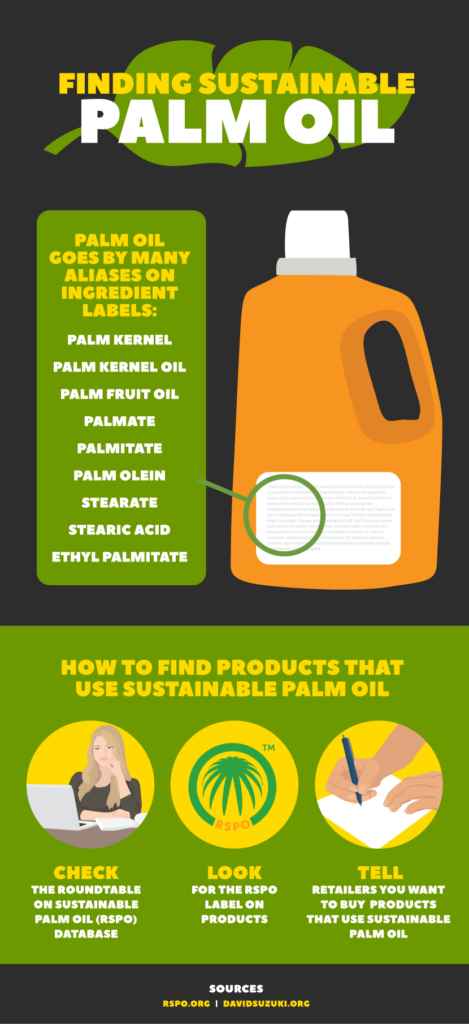Why palm oil is a disaster waiting to happen
Author’s note: This is the second in a multi-part series on fats (updated) — in a recent column about trans fats, we see that in many, but not all countries, trans fats have been eliminated, due to their known health hazards — read Part I here. In Part III I’ll discuss “natural” fats like palm oil and coconut oil and if they’re really “healthy” or is it hype?
What are ‘trans fats’ anyway? Also known as ‘hydrogenated fats’, they are made from liquid vegetable oils that in factories undergo a process called “hydrogenation” which rearranges the molecular shape which is an abnormal “trans” shape — they are fairly solid at room temperature.
Trans fats became popular in the early part of the twentieth century to replace expensive butter — margarine is one example. All packaged food can contain trans fat — from baked goods and spreads to frozen foods, cake and brownie mixes, ready-to-use frosting and biscuit and cinnamon roll dough, snack bars, coffee creamers, cereals, soups, salad dressings, dips, sauces, peanut butter, even low-fat ice cream… and of course, microwave popcorn. Trans fats are cheap to produce from cheap vegetable oils, and they last a long time. They give taste and texture to foods, and restaurants and fast food outlets love trans fats because the oil can be reused many times in commercial fryers.
But there is a critical downside to the consumption of hydrogenated fats. Scientists found that rather than being “better” than animal fats, trans fats significantly increase the risk of heart disease.
In 2018 the World Health Organization led the initiative to band trans fats by 2023, and some countries have moved to restrict or ban them, including Denmark, Switzerland, Canada, Britain, the U.S., and Ecuador, but what is the alternative?
Unfortunately, manufacturers have turned to palm oil.
Like trans fat, palm oil is also cheap, shelf-stable, and has a creamy texture. It contains zero trans-fatty acids and contains an equal amount of saturated and unsaturated fats. As reported in Amazon Front Lines, palm oil is nicknamed the “Goldilocks oil” because it’s neither too liquid nor too solid at room temperature, and much like trans fat, it’s perfect for commercial baking.
The Guardian reports that worldwide use of palm oil has exploded — on average each person consumes eight kilos of palm oil yearly! It’s used in hundreds of products, from cheap frying oils to foaming agents in just about every shampoo, liquid soap, or detergent. It’s used in cosmetics, and in dozens and dozens of processed foods from cookies, to crackers, to candies, to ice cream. It’s used as a raw material in cheap biofuels, it’s in toothpaste. It’s everywhere.
More than 85 percent comes from Malaysia and Indonesia, with the rest from the tropical Amazon: wherever it is grown — fires are set to clear forests and create land for more palm plantations. These fires are the top source of greenhouse gas emissions in Indonesia, destroying the habitat of Sumatran tigers, Sumatran rhinos, and orangutans. The indigenous people of the Amazon from Ecuador to Brasil are suffering from deforestation and pollution from pesticides and processing plants that dump into the river. Read more from CulturalSurvival.org here.
What is palm oil’s cost to health and the environment?

In 2008, the Roundtable on Sustainable Palm Oil developed a certification for sustainable palm oil. To date, 68 growers and 281 palm oil mills producing 11.37 million tons of palm oil have been RSPO-certified.
The World Wildlife Fund writes, “Palm oil’s exceptional growth has brought economic and employment benefits for millions of growers, but it has also brought unprecedented threats to forests, wildlife, and people where oil palm is grown and harvested. For this reason, companies, NGOs, governments, and other stakeholders are working together to move the entire palm oil sector toward a more sustainable future.” Read the full report, Sustainable Sourcing Guide For Palm Oil Users.
The products that contain palm oil are generally the same as those that formerly were processed with trans fats. As I said in my previous article on trans fats, I think that palm oil is no better for you than trans fats, and isn’t that beside the point? Isn’t replacing trans fat with palm oil ignoring the problem of overconsumption of overly processed foods? Kind of like replacing cigarettes with vaping — swapping one addiction for another doesn’t make vaping a healthy alternative.
A reader shared this segment from the Netflix Series: ‘Our Planet: Jungles’ – This episode highlights the threat of the unsustainable expansion of oil palm. If you want to go straight to the part about the decimation of the palm jungles, go to minute 40.
How to avoid palm oil?
It’s easy to avoid palm oil — read the ingredient label first, just as you would avoid trans fat by looking for “hydrogenated” or “partially hydrogenated” fat in the ingredients. GAIAM offers these tips:
- The most common name palm oil is disguised under is “vegetable oil.”
- Most prepackaged snack foods made by corporate giants (Nestle, Unilever, etc.) contain palm oil.
- If a product’s saturated fat content makes up more than 40 percent of its total fat content, it will almost always contain palm oil.
- Ingredients with the word “palm” in them are palm oil or are derived from the oil palm fruit.
- If you’re not sure whether a product contains palm oil, either type the product name into your search engine along with “palm oil” and scan the search results, or contact the company and ask if they use palm oil.
- To avoid palm oil, choose products that contain clearly labeled oils, such as 100 percent sunflower oil, corn oil, olive oil, coconut oil, or canola oil.
The steps taken by the World Health Organization (WHO) to eliminate trans fats from our global food supply are important. However, a key piece of the conversation is missing. What are the alternatives?
Trans fats are bad for our health: the WHO reminded us this week that five billion people worldwide are exposed to the negative effects of trans fats, which the WHO claims are responsible for more than 500,000 premature deaths due to coronary heart disease. In India alone, trans fats are responsible for 60,000 deaths.
The progress made by the WHO is certainly commendable. It has convinced governments of countries representing one third of the world’s population to adopt measures to limit the harm trans fats can cause. It has also won the support of industry to reduce the presence of trans fats in the food supply chain as well as cutting down on salt, sugar, and saturated fat. If plans to eliminate trans fats from our food supply by 2023 are successful, the WHO is optimistic that ten million deaths due to cardiovascular disease can be averted.
However, it is important that, as the presence of trans fats in our lives is reduced, we do not turn to dangerous alternatives. As trans fats cease to be in vogue, palm oil – noted for its high content of saturated fat and associated effects on health – is anticipated to be a lucrative product in the coming years.
“India accounts for seventeen percent of the world’s palm oil consumption. The effect this consumption exerts on ecosystems, both domestically and abroad, cannot be overlooked.”
In India, consumption of palm oil has increased by 230 percent since 2001, from three million tonnes that year to almost ten million tonnes last year as reported by Down to Earth. The growth in demand for palm oil suggests that, even as efforts to limit Indians’ intake of trans fats take shape, other unhealthy alternatives are still available in abundance – even as Reuters reported last year that palm oil imports were hitting a six-year low.
Palm oil is regarded by some as a desirable alternative to trans fats, but that is far from wholly vindicating it as a substitute. As noted by Harvard Health Publishing, “palm oil [is] less saturated than butter and contains no trans fat. But just because it’s not as bad as trans fat doesn’t make it a health food.”
We must also consider the environmental implications of palm oil. Fix.com reports that “an area about the size of 300 football fields is cleared each hour in tropical rainforests for palm oil production.” A mere seventeen percent of palm oil production globally is sustainable, the outlet adds.
India accounts for seventeen percent of the world’s palm oil consumption. The effect this consumption exerts on ecosystems, both domestically and abroad, cannot be overlooked. In particular, palm oil production can exert a ruinous impact on water supply. As The Wire reports, “studies indicate oil palm plantations threaten water quality changing freshwater ecosystems for decades, lowering the water table, which can lead to increasing concentrations of arsenic in drinking water, and adding salinity to coastal freshwater.” In a country already grappling with a burgeoning water crisis and an ongoing pollution catastrophe, appraising the environmental risks of palm oil in the context of deforestation and water ruination is vital.
The WHO’s steps towards notifying the world of the problems trans fats pose to consumers’ health are highly important. However, this cannot lead to a situation where one food component damaging to health and the environment is simply substituted with another. Nutrition policies sustainable both to health and the environment are very much the need of the hour.
Sources:
Amazon Front Lines. Palm oil: unhealthy for you and the Amazon.
GAIAM.com. Six ways to avoid palm oil (and why you should).
Health Issues India. Turn away from trans fat, but don’t look to palm oil.
The Guardian.com. How the world got hooked on palm oil.
World Wildlife Fund. Palm Oil.
_______________________
Food, Nutrition, and Your Health columnist Susan Burke March moved to Cuenca after working for more than 25 years as a Registered and Licensed Dietitian and Certified Diabetes Educator in the United States. She currently serves as the Country Representative from Ecuador for the Academy of Nutrition and Dietetics.





















